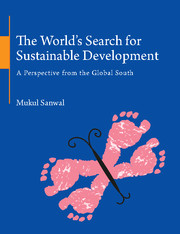Book contents
- Frontmatter
- Dedication
- Contents
- Preface
- Acknowledgments
- Abbreviations
- INTRODUCTION
- 1 Social Dimension of Sustainability
- CONSUMPTION IN AN UNEQUAL WORLD: FRAMING INTERNATIONAL COOPERATION
- CLIMATE POLICY: GLOBAL TO NATIONAL
- SUSTAINABLE DEVELOPMENT: NATIONAL TO GLOBAL
- 12 Conceptual and Institutional Foundation
- 13 Politics within the United Nations
- 14 Limitations of the Building Blocks of Sustainability
- 15 Use of Natural Resources
- 16 Distribution of Natural Resources
- CONSUMPTION IN A MORE EQUAL WORLD: SHAPING SOCIETAL FUNCTIONS
- GEOPOLITICS TO GEOECONOMICS: RURAL–URBAN DIVIDE, RATHER THAN BETWEEN COUNTRIES
- THE ASIAN CENTURY
- Index
14 - Limitations of the Building Blocks of Sustainability
from SUSTAINABLE DEVELOPMENT: NATIONAL TO GLOBAL
Published online by Cambridge University Press: 18 December 2015
- Frontmatter
- Dedication
- Contents
- Preface
- Acknowledgments
- Abbreviations
- INTRODUCTION
- 1 Social Dimension of Sustainability
- CONSUMPTION IN AN UNEQUAL WORLD: FRAMING INTERNATIONAL COOPERATION
- CLIMATE POLICY: GLOBAL TO NATIONAL
- SUSTAINABLE DEVELOPMENT: NATIONAL TO GLOBAL
- 12 Conceptual and Institutional Foundation
- 13 Politics within the United Nations
- 14 Limitations of the Building Blocks of Sustainability
- 15 Use of Natural Resources
- 16 Distribution of Natural Resources
- CONSUMPTION IN A MORE EQUAL WORLD: SHAPING SOCIETAL FUNCTIONS
- GEOPOLITICS TO GEOECONOMICS: RURAL–URBAN DIVIDE, RATHER THAN BETWEEN COUNTRIES
- THE ASIAN CENTURY
- Index
Summary
The thrust of the Rio+20 Conference on a green or low carbon economy in the context of eradication of poverty focuses global attention on total planetary biophysical limits. Moving from prices to quantities and the economics of human development as the basis for international cooperation will require focus on consumption patterns. For the first time global goals are being considered not just for emerging countries but for all countries. These shifts bring out the limitations of the conceptual framework of sustainable development based on three pillars – economic, environmental and social – even when they are not seen as silos. The current framework focuses on production patterns in emerging countries while efforts to incorporate consumption patterns of all countries enhances the understanding of the concerns, and also serves to emphasise the need for a new framework that will respond to the aspirations of the rural poor to shift to urban areas and the needs and impacts of the growing urban middle class.
Economic sustainability: modifying natural resource use
With all economies being increasingly driven by the urban services sector, and not just by industrialization, global environmental change is being driven by the lifestyles of the wealthy citizens worldwide. The International Energy Agency points out that in industrialized countries, on the consumer side of the economy, technological and lifestyle changes combined with higher incomes have significantly altered energy use patterns since the Convention on Climate Change was negotiated in 1992, with over two-thirds of carbon dioxide emissions now coming from the services, households and travel sectors, they account for more than half the increase in global emissions since 2005, and it is expected that emissions from transportation (largely for leisure) will exceed half of global emissions in 2050. There is also a high correlation between per capita GDP and municipal solid waste [UNEP, 2011]. In industrialized countries, energy use in manufacturing has remained unchanged in the period 1990–2004, while buildings consume 40 per cent of the electricity generated. Energy consumption has increased by 50 per cent in the services sector, by 35 per cent in households, and by 25 per cent in transportation, as a result final energy use – and emissions of carbon dioxide – have each increased by 14 per cent [IEA, 2007].
- Type
- Chapter
- Information
- The World's Search for Sustainable DevelopmentA Perspective from the Global South, pp. 194 - 199Publisher: Cambridge University PressPrint publication year: 2015

